The boy's father Owain ap Marededd ap Tudur’s origins are somewhat vague, he is said to have arrived at the court of Henry V in 1415, but at some point, he was under the command of the Welsh warrior Dafydd Gam, the maternal grandfather of the Vaughan's of Tretower and a staunch opponent of Owain Glyndwr. Tudor’s affair with Catherine of Valois had been conducted away from court and resulted in a number of other children. The twenty or so years that covered their adolescence under the control of the aforementioned Katherine de la Pole appear to have been unremarkable and prior to them being formally recognised as Henry VI’s legitimate uterine brothers in 1452, and their ennoblement as Earls of Richmond and Pembroke, their ‘Welshness’ can be called into question, Edmund, it seems, had no connection with the Welsh until after his marriage to the teenage Margaret Beaufort in 1452, and neither did Jasper until he moved into Pembroke Castle and took up Lancaster's cause.
|
3rd November 1456 Edmund and his brother Jasper had arrived at the court of their half-brother Henry VI in 1446, four years earlier, following the death of their mother, Catherine of Valois, the two boys had been placed under the care of Abbess of Barking Katherine de la Pole, the abbey was paid an allowance of £52 12s for their care. It was Katherine who introduced and encouraged the relationship with Henry VI, this was more to do with lack of money for her to continue their support, rather than noticing that they were a couple of likely candidates for the ‘Wales Got Talent’ contest. Henry accepted them into his court, it may have been for dynastic reasons or personal reasons, no one really knows, although it must have been of some comfort to a quiet and retiring king to have brothers on whom he thought he could rely. The boy's father Owain ap Marededd ap Tudur’s origins are somewhat vague, he is said to have arrived at the court of Henry V in 1415, but at some point, he was under the command of the Welsh warrior Dafydd Gam, the maternal grandfather of the Vaughan's of Tretower and a staunch opponent of Owain Glyndwr. Tudor’s affair with Catherine of Valois had been conducted away from court and resulted in a number of other children. The twenty or so years that covered their adolescence under the control of the aforementioned Katherine de la Pole appear to have been unremarkable and prior to them being formally recognised as Henry VI’s legitimate uterine brothers in 1452, and their ennoblement as Earls of Richmond and Pembroke, their ‘Welshness’ can be called into question, Edmund, it seems, had no connection with the Welsh until after his marriage to the teenage Margaret Beaufort in 1452, and neither did Jasper until he moved into Pembroke Castle and took up Lancaster's cause. In 1455 as mentioned he had married the twelve years old Margaret Beaufort and wasted little time getting her pregnant, the poor child gave birth to the future Henry VII a year later. However, Tudor was not destined to see his only child, he was dead of the plague by the end of this day in 1456. Tudor was buried at Greyfriars in Carmarthen where his tomb lay undisturbed until the Reformation when it was removed to the choir of St David's Cathedral, where it can still be found today.
0 Comments
The 2nd of February in 1461 is the date usually given for the Battle of Mortimer's Cross, but according to Davies Chronicle and an account that reached the Milanese ambassador, Prospero Camuglio, the battle was fought on the following day. The two armies met not too far from Wigmore at Mortimer's Cross in Herefordshire, and it was in this battle that the future king would give those around him a glimpse of the man he was destined to be. The appearance in the sky the night before the battle of a Parhelion was, to Edward, a visual representation of the Holy Trinity and that God was on his side. It has been said of Edward that he was not particularly superstitious, but his men were and Edward possessed the presence of mind to use the three bright suns to his advantage. "Be-eth of good comfort and dreadeth not; this is a good sign, for these three suns betoken the father, the Son and the Holy Ghost and therefore let us have good heart, and in the name of Almighty God go we against our enemies." Three Fifteenth Century Chronicles, with Historical Memoranda - John Stow The battle itself lasted into the afternoon, eventually the Lancastrian troops were pushed back and retreated southwards, many of their men lost their lives drowning in the freezing water as they crossed of the River Lugg, Jasper Tudor realised his cause was lost and fled back to Wales. Shortly after the battle Edward heard of the capture of Owen Tudor, he called on his Welsh ally Roger Vaughan and ordered him to Usk Castle, where it is said Tudor was held captive. Owen Tudor was summarily executed, beheaded in Hereford market square, it was Roger Vaughan who swung the axe. Edward was a king in the making, for now, there would be those whose indiscretions he could tolerate but not when it came to avenging the deaths of those he held dear, and Edward struck, just like John Clifford had at Wakefield. Edward would show he possessed courage and the military skill as well as intelligence. Image two is a modern interpretation of the events leading up to Battle of Mortimer's Cross that forms part of a parchment held at the British Library. The original, dated between 1460 and 1470, is one of five pairs of miniatures "pairing an event of Edward's career with its biblical precedent " This part of the parchment is an allegorical representation of Edward's fulfilment of a prophecy witnessed the day before the battle. Yesterday my research took me to Wales, via books and the internet sadly, to the castle of Pen-Pont that once stood on the bank of the River Usk. My interest in Wales is concerned with the Vaughan family of Tretower, I found some interesting stuff while I was rifling through some of my notes and it links nicely with my blog, "Vengeance in Mine" which I posted here on my website a while ago. Here is what I found....... Alice Bredwardine (the Bredwardine's were the ancestors of the Vaughans) was the mother of Sir John Scudamore who had secretly married the daughter of Owen Glyndwr. The story goes that John and Alice had hidden Glyndwr after which he was never heard of again. Interestingly, the Glyndwr legend is not unlike that of Cornwall's King Arthur, where it is said that he will one day appear to save his native Cornwall, Glynwr too is set to re appear to save his beloved Wales. A statute had been passed which forbade any Englishman with an alliance with Glendwr from holding any office, so Scudamore was stripped of his titles. The Scudamore’s son, was Henry, it was this Henry who was captured after Battle of Mortimer’s Cross, along with John Throckmorton and Owen Tudor, although he and Throckmorton may have escaped execution at Hereford, Owen Tudor, was not so lucky, his executioner was Roger Vaughan, the great great grandson of the Bredwardines (not Alice's line I must point out.) They say that truth (if this story is true) is better than fiction....I have to agree with that!
Here is a link to my blog if you wish to read where Henry Scudamore, Owen Tudor and Roger Vaughan fit in. http://meanderingthroughtime.weebly.com/blogs-on-the-wars-of-the-roses-1376-to-1478/vengeance-is-mine Behavioural scientists who have studied revenge scanned the brains of people who had been wronged, and the researchers gave these people a chance to punish the wrongdoers. As the victims considered revenge, it was noted that this action caused a notable amount of activity in what scientists call the Caudate Nucleus, an area in the brain that processes rewards, which the researchers equated to the same feeling we feel when we smoke or eat chocolate. Just as one piece of chocolate doesn't satisfy our craving, the act of revenge doesn't deliver justice, it prolongs hostility and leads to other acts of vengeance, creating an unending circle of retaliation. Revenge is ages old, God himself wanted the monopoly on it, Shakespeare wrote of it and the leather clad Beatrix Kiddo practiced it, but vengeance comes at a cost, no more so than in the time of the Wars of the Roses. Deaths as the result of vengeance were frequent occurrences, Edmund, Earl of Rutland, Owen Tudor and Roger Vaughan are an example of this practice. Their deaths were linked, they died over a ten-year period, but despite this length of time and not surprisingly, the pain each felt never diminished, but what is surprising is that each of the condemned never expected it to happen to them and each pleaded for his life. On the 25th of October 1460, the Act of Accord acknowledged Richard, Duke of York, as the heir to Henry VI and effectively disinherited Henry VI’s son Edward. It was hoped that this agreement would put an end to the political tension that had caused so much trouble in previous years, but it was not to be. The Act of Accord naturally left the Lancastrians foaming at the mouth, many were angry that the act had swept the rules of primogeniture under the carpet, a rule that had protected the rights of the noble family for decades, without which there would be chaos. Many Lancastrians rallied to the cause resulting in a number of revolts occurring in the country with Henry's queen, Margaret of Anjou, at its helm. The first serious clash happened in Yorkshire, just over two months after the Act of Accord was signed, as Margaret had headed to Wales, Richard, Duke of York, now heir apparent made his way towards Sandal Castle to meet the forces of the opposing army, even though York's force outnumbered the Lancastrian's by two to one the battle went the way of Lancaster. Richard, Duke of York died in battle that day at Wakefield. David Hume in his History of England writes of York's death "The Duke himself was killed and beheaded, and when his body was found among the slain, the head was cut off by Margaret's orders and fixed on the gates of York, with a paper crown upon it, in derision of his pretended title.' York died among his men, a noble death you could say, his second son, Edmund Earl of Rutland died that day too but his death was a cruel one at the hands of John Clifford. Clifford had a reputation for brutality on the battlefield, John Leland, wrote in 1540 that Clifford was 'for killing of men at the bataill was caullid the boucher.' The most common story told is that Edmund was captured as he fled the battle field, but the quality of his armour was noticed by Clifford who asked him his name. At that point, it seems, Clifford was unaware who Rutland was and was possibly thinking along the lines of a ransom, but a priest going by the name of Aspell shouted "spare him for he is the Prince's son." And thus Rutland's fate was sealed. It was then that John Clifford saw an opportunity to avenge his father's death, his father Thomas Clifford died in the first battle of St Albans in 1455. For Clifford the "sight of any of the House of York was fury to torment his soul" It is John Leland, the 16th century antiquary, who first mentions that it was Clifford who murdered the seventeen-year-old Edmund, William of Worcester in his Annales Rerum Anglicarum writes "and in the flight after the battle, Lord Clifford killed Edmund Earl of Rutland, son of the Duke of York, on the bridge at Wakefield." but its Shakespeare who puts the following words into Clifford's mouth. "Thy father slew mine; and so will I do thee and all thy kin" Thus the seeds were set for bloody revenge, it was Owen Tudor who was the next to die on the order of another angry and grieving young man. Edward had celebrated the Christmas of 1460 in Gloucester with John Tuchet, Walter Devereux, William and Richard Herbert and Roger Vaughan. These five Welsh men were, not only linked to one another by blood and marriage but were an important part of the Yorkist political connection, it was Roger Vaughan of Tretower, who in 1461, would be Edward's henchman. Tudor, along with his son Jasper, had been recruiting men from Wales previous to the Battle of Mortimer's Cross and had made their way to Herefordshire by the beginning of February 1461. After the battle, the elderly Welsh leader was captured along with Henry Scudamore and John Throckmorton. On the news of Tudor's capture, Edward ordered Roger Vaughan to Usk Castle, where it is said Owen Tudor was held captive. Scudamore and Throckmorton may have escaped death but Tudor was summarily executed, beheaded in Hereford market square, the axe swung by Roger Vaughan. The story of how Tudor met his death is much written about as are his final words "That hede shalle ly on the stroke that was wonte to ly on Quene Kateryns lappe' Even though Edward could be lenient if he wished, he had no intention of being so with Owen Tudor. Tudor was executed not because he, along with his son Jasper, was making some attempt to free Henry VI from his captor, or that he had recruited troops in Wales or taken up Margaret of Anjou's cause or because of any treasonous act. Owen Tudor met his death because Edward was determined to avenge the death of his father and brother just as Clifford had. The Earl of March, as Edward IV, did not require that his men love him, but he certainly expected them to obey him. Twenty three days after the Battle of Mortimer's Cross and the death of Owen Tudor, Jasper Tudor wrote to Roger Puleston, Governor of Denbigh Castle, of the defeat at Mortimer's Cross and how he would avenge the death of his father. "Right trusty and well beloved cousins, and friends, we grete you well. And suppose that yee have well in you remembrance the great dishonour ahd rebuke that we and yee late have by traitor Marche, Harbert and Dunne, with their affinityes, as well in letting us fo our journey to the Kinge, as in putting my father your kinsman to the death, and their trayterously demeaning, we purpose with the might of our lord, and assistance of you and other our kinsman, men and friends, within a short time to avenge. Written at our towne of Tenbye the xxvth of ffeur. J Penmroke" Jasper Tudor would spend the next twenty five years as a man on the run, in those years he remained bitter, bitter about the Lancastrian's final defeat, bitter about the loss of land and power in Wales, but he never forgot the name of the man who decapitated his father, but it was ten long years before he would be face to face with him. During Tudor's exile, the Lancastrians made some attempt to drum up support in Brittany, France and Scotland, invasion plans were made and thwarted but eventually Jasper Tudor along with Richard Neville, and Edward's brother the Duke of Clarence arrived in England and landed in Dartmouth and headed for Wales picking up Henry, the future Henry VII on the way. Henry VI was restored to the throne of England on the 30th October 1470, it is Jasper Tudor who had played a significant role in the restored Lancastrian regime but it was, as we have seen, at a personal loss to himself. Is it any wonder then that he seized the opportunity when it did arrive, of unleashing all his pent-up anger on one man, Roger Vaughan. The Vaughan's were a rich and influential Welsh family, who received the lands and castle of Tretower in the historical county of Brecknockshire via marriage to the daughter of John Bluet of Raglan. Roger Vaughan was active in the service of the Yorkist and as we know he was with Edward, Earl of March at Mortimer Cross. Whilst Jasper Tudor was effectively in exile, his Lancastrian supporters had not been inactive, Roger Puleston, Philip Mansel and Hopkin ap Rhys had been causing problems and it was Roger Vaughan who quashed an insurrection at Carmarthen. Vaughan did his job and captured all three men, but Edward decided to pardon all three, and Rhys and Mansel's land were forfeited and given to Roger Vaughan. It was at Tewkesbury, in the May of 1471, that all the hopes of the Lancastrians were dashed, Edward, son and heir to Henry VI was dead. Roger Vaughan, it seems, did not fight at Tewkesbury, neither did Jasper Tudor, he was holed up at Chepstow Castle. Edward, as Edward Hall, the 16th century chronicler pointed out was "not beynge out of feare for the Earl of Pembroke" Edward ordered Vaughan and William Herbert to Chepstow to take Jasper Tudor, but unfortunately for Vaughan, Tudor knew he was coming, and his thoughts quickly turned to revenge. Vaughan, Hall continues was "stronge of people and frendes, to the entendt of some gyle or sodaynly to trap and surprise the erle" but it seems, Jasper Tudor wasn't without friends himself "having intelligence of certayne frendes how that watche was privilie leyed for him, sodainly in the town took Roger Vaughan" His father's executioner was captured. According to John Leland, who was writing during the time of Henry VIII, Roger Vaughan pleaded for his life, the words he received in reply were "that he should have such favour as he shewid to Owene his Father' Roger Vaughan, executioner of Owen Tudor, went to the block within the town walls of Chepstow, his death was the last in this chain of retaliatory acts. No one avenged his death, although one Guto'r Glyn, Welsh bard and poet and an adherent to the Yorkist's did call for vengeance on his behalf. Interestingly, the word feud in English and in Latin means the threat to take revenge and these acts of vengeance were often the results of a long standing feud, and you will get no bigger than the ill feeling between York and Lancaster.
Vengeance, in whatever time period, is one of the worst of human traits, but it is an intriguing one nonetheless. So, what is vengeance? It is a word often used to explain and justify violence, and the violent actions of Jasper Tudor, Edward IV and John Clifford, were an act of personal vengeance. The actions of these three men were allowed to happen because medieval law permitted vengeance, and as long as this kind of action is sanctioned by the king and carried out by one of his nominated officers it was not murder. Let me end with the words of Martin Luther King Jr "The old law of 'an eye for an eye' leaves everybody blind." |
Categories
All
Archives
May 2024
|
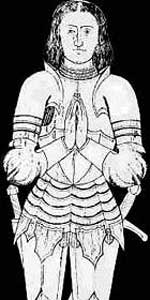
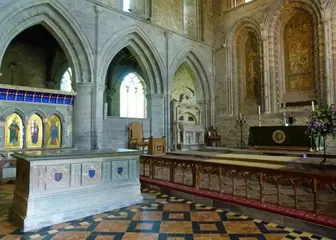
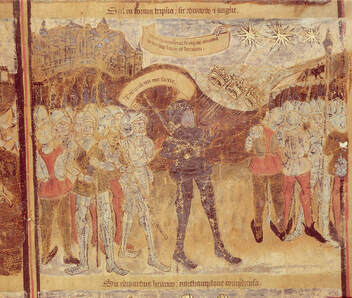
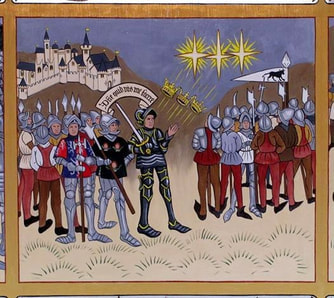
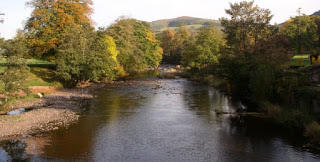
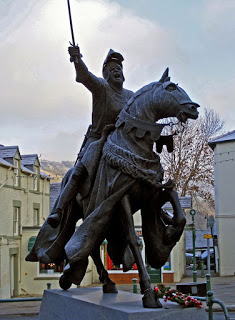
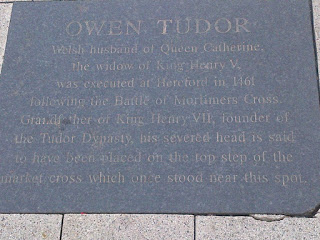
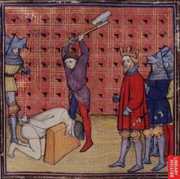
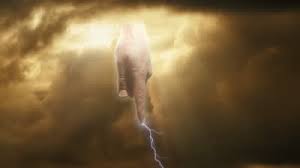
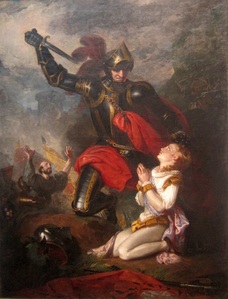
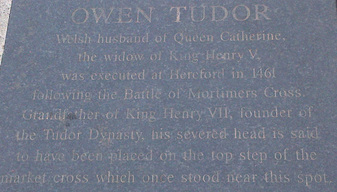
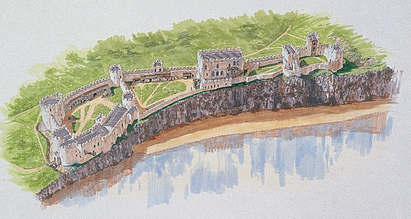
 RSS Feed
RSS Feed
